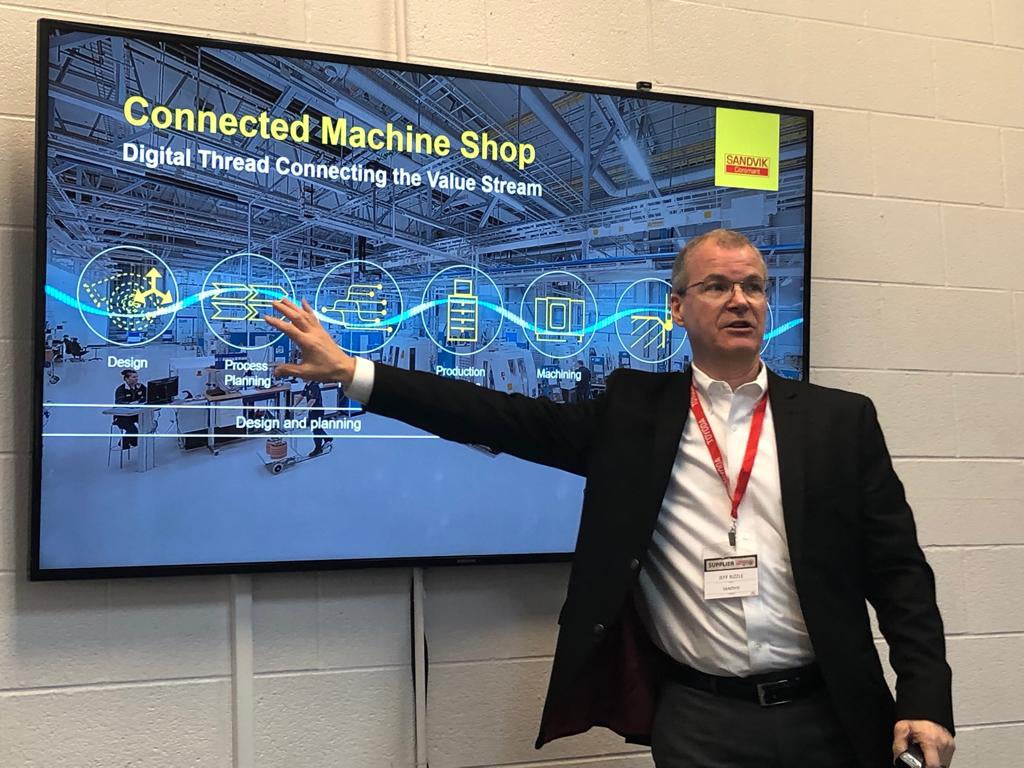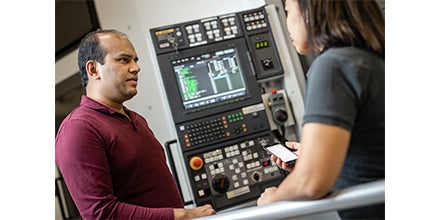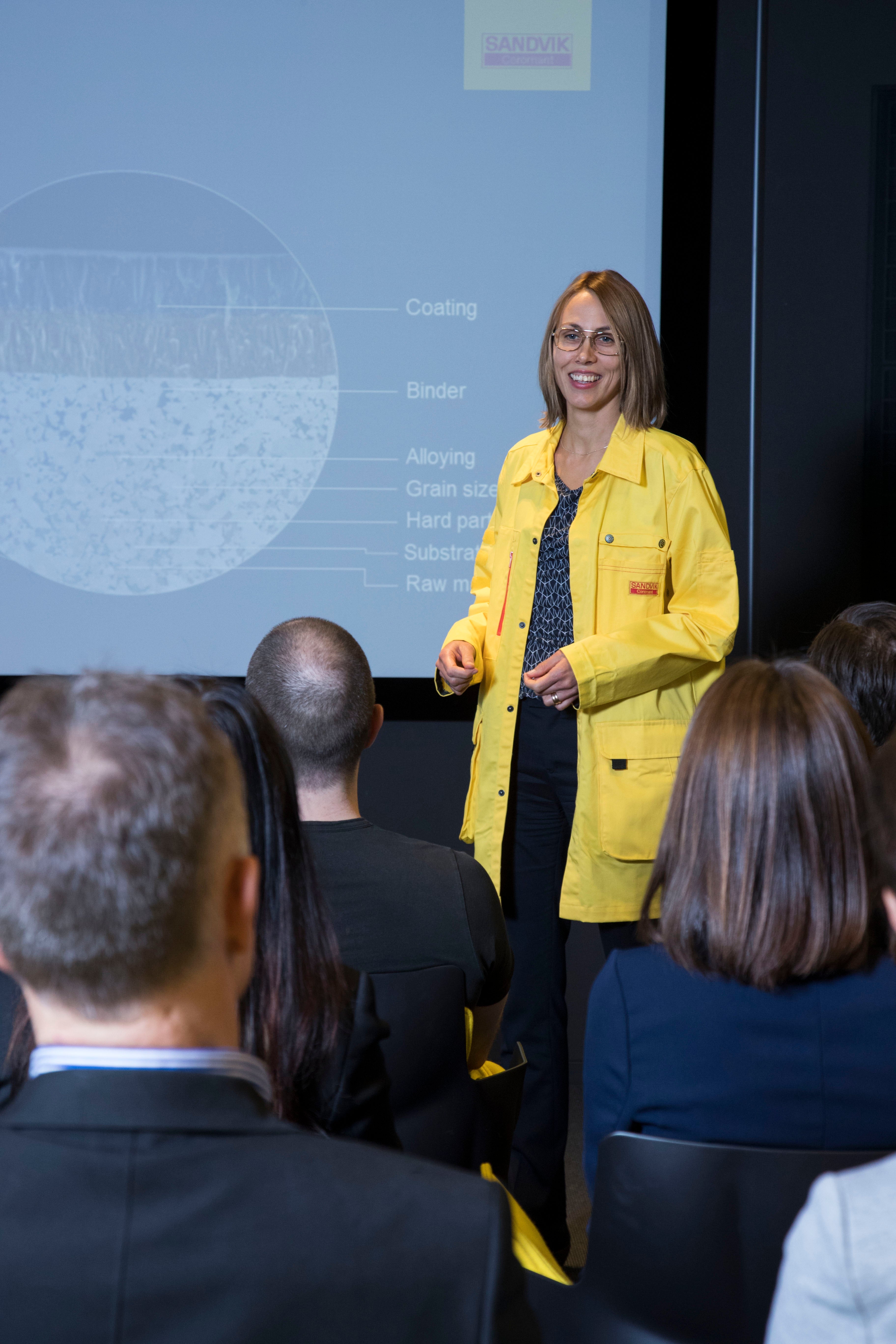Five Questions with...Jeff Rizzie
Jeff Rizzie, Sales Director for Digital Machining, recently spoke at a Women in Manufacturing (WiM) gathering where he talked about digitalization and manufacturing. WiM is the only national trade association dedicated to providing year-round support to women who have chosen a career in the manufacturing industry. Here's what Jeff has to say about that meeting, including diversity in the manufacturing industry, new roles and skillsets needed for the future workforce and his passion, the connected machine shop.

Sandvik Coromant: You recently spoke to a group of women at a WiM function. What was your biggest takeaway from that event? Were any women present who own or work in a connected machine shop?
Jeff Rizzie: For me, this was the most engaged and interactive audience that I have spoken to about digital machining. While no one at the event had firsthand experience with implementation of the Industrial Internet of Things (IIOT) solutions, this was clearly a hot button issue that some members have been exploring over the past year and the interaction was fantastic.
There were no women present that have already made great strides towards the connected machine shop, but clearly, there were some that were beginning to engage the process. To be honest, this isn't unique to just women in manufacturing as the industry itself hasn't yet moved beyond the hype of Industry 4.0 towards real solutions that will help them run their machine shops better. The engagement during the Connected Machine Shop presentation was, to me, quite exciting and gives me great hope for the future of manufacturing.
SC: In your opinion, what are some advantages of having more women in the manufacturing workforce?

JR: For me, it's the diversity of thought that is most exciting when I think about the challenges we face in machine shops every day. I think it gives us the best opportunity we ever had to change the conservative culture that dominates machine shops today and to move from the "this is the way we've done it for 30 years" mentality. If you consider that with some exceptions, women are relatively new to machining, the fresh look and approach they can bring can be quite powerful.
SC: Do you see more roles for women in the future manufacturing workforce? Why?
JR: I do. While I believe that women are already well equipped for the traditional shop floor roles (for example, as machinists, manufacturing engineers, programmers, machine operators, ops planners, etc.) as well as management positions, the emergence of newly required roles (i.e., data science, robotic integration, automation engineering, etc.) represents an exciting opportunity for women to engage in manufacturing careers that have the possibility to dramatically transform the industry.
SC: If you could change one thing about the perception surrounding manufacturing and digitalization, what would it be?

JR: It would be the misconception that we need to wait for Industry 4.0 (I4.0) to be finalized before we start implementation. It's important to note that Industry 4.0, in and of itself, is not an actual solution for manufacturing but an idea that we should look for ways to apply digital technology in the manufacturing space, to drive improvements in efficiency, reliability, security and accuracy. For me, the current discussions about I4.0 are still too general, without differentiating the needs of the specific manufacturing verticals (i.e., making a product like Coca-Cola vs. machining a landing gear for an airplane) making it confusing for people to understand how this will address their specific issues and/or how to get started. That's why I think it's imperative to bring I4.0 down to the shop floor (The Connected Machine Shop), developing a vision that addresses all areas of the machine shop value stream. A vision that moves machining from primary reliance on tribal knowledge to one that builds system knowledge and data driven decision making. I also believe that we cannot afford to wait for a "complete solution to be ready" before we begin our connected machine shop journeys. We need to have a vision of what we would like to achieve in the long run but understand that the vision will evolve as technology changes over the coming years and this shouldn't prevent you from getting started. There's an adage in the technology industry that I think applies perfectly to the Connected Machine Shop...Think big, start small, move quickly.
SC: How can employers do a better job of attracting more women into the manufacturing workforce?
JR: There are many ways we can do a better job of attracting women into the manufacturing workforce. One way is to start exposing girls to STEM-focused activities and technology clubs at schools such as Girls Who Code at school as early as possible. We also need to provide them with exposure to manufacturing specific opportunities like plant tours, manufacturing competitions, mentorships and career planning through our school guidance offices. At our Sandvik Coromant Centers in Schaumburg and Fair Lawn, we host local students for MFG DAY every October giving them an opportunity to see what a modern machine looks like and we discuss career options within the industry. And national organizations such as Women in Manufacturing do an excellent job of highlighting various careers in manufacturing, offering women opportunities to expand their networks and gain valuable education and insight to further their careers.
Bonus question: What is your favorite Sandvik Coromant tool and why?
JR: I'll give you two...1. CoroPlus MachiningInsights: while it's not really a traditional tool, this is a solution that I wish I would have had access to when I was working in the machine shop. What's really happening inside our machine tools and why aren't they running has long been a mystery in machine shops. MachiningInsights not only provides complete transparency on how our assets are being utilized but also have the potential to be an enabler for so much additional technology in the machine shop. Learn more about MachiningInsights.
2. Silent Tools: I love SilentTools because they work well with excellent results. Over the years, I have had numerous occasions to apply Silent Tools on long overhang applications and have never had a situation where the machining process didn't improve dramatically as a result.
About Jeff Rizzie
Jeff Rizzie has 40 years of technical expertise centered around manufacturing processes with a concentration in metal cutting and machine tool integration. He has extensive international strategic planning and leadership experience working to drive and support key initiatives for customers. If you'd like more information about your connected machine shop, contact Jeff at jeff.rizzie@sandvik.com for a consultation.
About Women in Manufacturing (WiM)With more than 2,500 individual members representing nearly 900 manufacturing companies, Women in Manufacturing is a growing organization of industry professionals. WiM encompasses manufacturers of all types and welcomes individuals from every job function – from production to the C-Suite. Membership is available to women and men working within the manufacturing sector. Click here to learn more.


